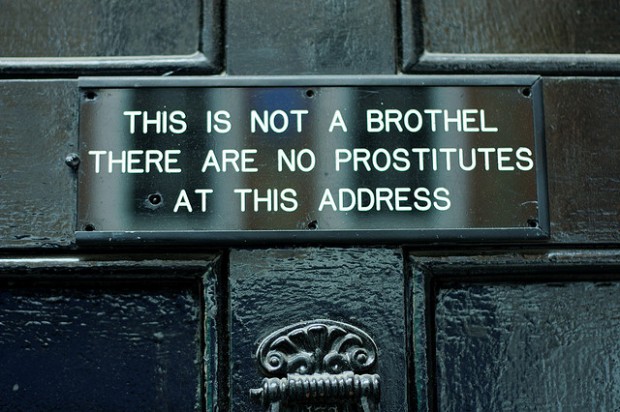You have no items in your cart. Want to get some nice things?
Go shopping
A woman is sitting alone at the hotel bar with a glass of something orange in front of her. You wouldn’t know straight away that she’s a prostitute. She’s wearing glasses and her clothes look simple. The bar’s other customers do not bring sex to mind, necessarily. Middle aged couples, a few men having a drink. It’s one of these expensive, soulless hotels that cater to business people, not far from Marble Arch.
Then a friend tells you that the woman is a hooker and the way you look at her changes. She takes off her glasses from time to time and you see how beautiful her face is, how smooth; how straight her nose and how full her lips. Her wavy black hair is tied back and seems to want to escape, to explode out of its grips.
It’s early in the evening and for the lonely, horny man, finding paid-for sex to satisfy his urge is simple. It’s just a question of how much he’d like to pay. He could go up to that woman at the bar. Or go half a mile away to Soho, where sex is more blatantly for sale. Models upstairs, says a hand-written board. In its tight winding streets are neon lit signs for sex toys, peep shows, strip clubs. More discreet are the ‘walk ups’, where women are on offer for as little as twenty five pounds for ten minutes. In Mayfair, the more expensive sex workers haunt the bars of hotels and the really organised ones cruise the streets in their own cars, propositioning men. Online, courtesans have their own websites and advertise when they’re next in town.
As a Londoner, I’ve grown used to living side by side with these sex workers, aware of them but never interacting with them in any way. But now I’m interested in investigating further.
At first it goes smoothly. As an ex-anthropology student, I’ve read Professor Sophie Day’s riveting ethnographic account of prostitutes and prostitution, ‘On the Game.’ And there is so much information online, a few clicks away. I unearth a 2009 research study by the Eaves Project, initiated by feminists Mellissa Farley and Julie Bindel. Researchers have interviewed 103 London users of prostitutes, and the findings are grim. It reads like a study in sociopathy. The men quoted utter a series of shocking remarks, and from them a picture can be built up of a total lack of empathy at the core of these sexual encounters.
Another few clicks of the mouse and I’m on PunterNet.com, one of the websites ‘johns’ use to evaluate their experiences with prostitutes. I notice how the best reviews are given to women who smile a lot and seem to enjoy the sex. The negative reviews unfailingly mention that the prostitute looked unengaged or grumpy. One of the reviewers took exception at any sign of the woman’s body being marked by the signs of childbirth – breasts that were less than firm, stretch marks and looseness where tightness was what he wanted. Based on my cursory research, I agree with Bindel, Farley et al. Punters should be discouraged from visiting prostitutes, and the whole of the sex trade is an oppression, an abuse of women.
My project, I think, is taking shape. I’ll interview some sex workers for useful quotes and then write a piece vilifying johns and pimps. I type, full of lyrical outrage, and my draft reaches 1,500 words just like that. I’m delighted.
But then I do more research, and a week later I realise that everything I’ve written so far will have to be dumped. I have spoken to sex workers, found through online adverts and the International Union of Sex Workers, and what I discover is that I would be ashamed for these women to read the piece I was intending to write, my depiction of a whole body of women I don’t know as victims of men, pawns without a voice. It would be insulting and condescending.
The women I speak to this time are helpful and articulate. They are mainly concerned with running their businesses in a society where stigma and an unhelpful legal system can make things dangerous for them. Even if they are simply deluded and brainwashed – and I do not believe they are – I cannot discount everything they say. My piece will have to be gutted and restarted from scratch.
No one has absolute knowledge with regards to sex work today in the UK. It is a difficult field to investigate. Since access to sex workers requires an introduction by what is known as a ‘gatekeeper’, the process of study is often lengthy. But research has been done, by serious academic bodies, and I now realise that it is important to look beyond the media stories and beyond the first Google page that appears after you’ve typed ‘prostitution and men’. In fact, that research by Bindel and Farley elicited a negative response from 27 academics. They all expressed concern about the Eaves Project’s weak methodological rigour, the ‘salacious nature of the report and the media ‘hype’ that has been generated.
It is important to be aware of the opinions of radical feminists such as Bindel. However, hers is not the only way of looking at prostitution. Dr Suzanne Jenkins, of Keele University, did her own research using a sample of escorts. It showed that the women chose the job chiefly because of the money, the flexibility of working hours and the independence. The majority of these women felt that the ‘commercial transactions are relationships of equality’ – neither themselves nor the client were in an absolute position of power.
The sex workers I speak to for this article are what are known as ‘indoor workers’ – as opposed to those who work in the streets. I do not take them as examples of the whole of prostitution today, or infer from their testimony that every prostitute has chosen her job of her own free will. There is evidence to show that streetwalkers are more likely to be addicted to Class A drugs than other women, and plenty of disturbing research revealing that vulnerable women are being trafficked into London and put to work in saunas and flats. However, the women I contact have chosen prostitution and do not have a problem with it. They are clear-minded and do not glamourise their industry. One independent escort told me that, although she herself has found a way of working that she is happy with, she would not advise any woman under twenty-five to get involved.
Catherine Stephens, activist with the International Union of Sex Workers, tells me that she finds it odd that feminists like Bindel ‘assume that my consent is not my own to give’, ignoring the fact that some women do choose sex work of their own volition. Stephens, who has herself been a sex worker for eleven years, is extremely helpful when I phone her and answers my questions with patience. Her voice is calm and assured. Very down to earth, she underlines many times that she is ‘a sex worker, not an academic’. All the same, though, she has a good knowledge about a wealth of different studies, a fantastic memory, and an ability to convey the problems as they appear in her field.
She underlines the need to make policy based on evidence and expresses frustration at the way dramatic individual cases grab the headlines, TV debates swayed towards emotive conclusions. She describes her clients as ‘lovely people’. Asked about the PunterNet.com reviews, she answers that she’s ‘always been treated with consideration and respect’. She adds that, although she has no way of knowing what her customers are thinking, in the time they are with her they are ‘respectful and considerate of my boundaries’.
Another of the women I contact is Rhia Charles. She is a ‘courtesan’, the title that exclusive, higher-earning women give themselves. Rhia’s clients find her via a website which shows glossy pictures of her – a beautiful blonde in luxurious lingerie against the backdrop of an expensively furnished apartment. She tells me that the qualities a courtesan must demonstrate are ‘education, wit, intelligence, the ability to put someone at ease immediately, total discretion, sophistication, to be well travelled, the ability to talk about a wide variety of subjects, be well groomed and well dressed; they are obviously attractive and enjoy men’s company.’ She adds that ‘it’s not so much about looking like a supermodel as having a great personality and demeanour. It’s not all about sex either; it’s about friendship, companionship, someone who these men can totally relax and feel at ease with. Sex comes after that.’
Rhia lives in an exclusive part of London. Her favourite places for cocktails are the Savoy and the Dorchester. Asked about situations in which she may have felt threatened, she replies that she has never felt in danger. She does get ‘the odd crazy email’ but has a vetting process in place to ensure that she filters out people she does not want to see. She has become very adept at this. By the time men are allowed to meet her for sex, she has already exchanged emails, spoken to them on the phone and met them in a public place. Her website states that she only sees one or two clients a week, in the comfort of her discreet apartment.
However, as Catherine remarks, prostitutes are easy targets. ‘The way you work can make a difference,’ she says, ‘but if someone phones as a client, he could be the Yorkshire Ripper on day release’. She has never herself been a victim of violence but is aware that it only needs one person to get through the screening process for it to happen. The only way to try and avoid this would be for the law to change. At the moment, sex workers are isolated by a law that prevents them from working with other people. Social and legal stigma mean they don’t dare report violence for fear of being arrested. A UK Network of Sex Work Projects (UKNSWP) pilot project funded by the Home Office, called Ugly Mugs, has apparently proven helpful to sex workers. It enables them to warn each other about dangerous men, giving real-time data on violence and passing on details anonymously to the police. Ugly Mugs also gives a true picture of the number of assaults suffered by prostitutes.
Unfortunately, its funding runs out in March. Even this basic tool to ensure the safety of sex workers has had to be hard fought for, funds coming from the prostitutes themselves, and I get the feeling that this is either because no one else can be bothered or because everyone is too busy worrying about the morality of selling sex to look at the practicalities.
What strikes me as most odd in our age of apparent sexual freedom is that prostitutes are still stigmatised. The fact that other women join in this demonisation because they automatically believe that prostitutes are somehow either pandering to male power or too weak to think for themselves is a terrible pity. At the end of my weeks of marathon research I feel I know a little more about the reality of the lives of these women I keep catching glimpses of, my fellow Londoners. As Stephens says, ‘prostitution is simply the fact of selling sex’.
Walking home from a meeting in Soho, I take a last detour through Romilly Street. The door of the models upstairs walk up is open, the doorway gapes in darkness. In the windows of the flats upstairs the strings of red light bulbs are still glowing. There’s really nothing to see – and just for a moment it’s all a cipher again.
Subscribe to Litro Lab via itunes RSS | More

About Patricia Duffaud
Patricia Duffaud is a writer of mixed French and Northern Irish origin. She writes short stories, features and reviews and her work has appeared in Wasafiri Magazine, the Puffin Review and Thresholds. One of her stories was highly commended in the Gladstone's library's Mystery Lady short story competition. She is currently non-fiction editor for Litro online.



Sex for Sale | Litro https://t.co/CZnzCAfdyl